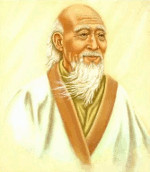Biography of Lao Tzu

Lao Tzu, also known as Laozi, Lao Tsu, Lao Tse, Lao Zi, Laotze or a number of other ways, is said to have lived in the sixth century BC according to Chinese tradition. However, recent scholars believe this is incorrect place the life of Lao Tzu in the fourth century BC.
Although little is known about the life of Lao Tzu, his cultural significance is important to the lives of generations of Chinese. According to Chinese tradition, Lao Tzu was born in Ku Prefecture of the Chŭ state, which today is named Lù yì County of the Henan province during the Spring and Autumn Period, roughly between 722 BC and 481 BC. Some legends state he was born with white hair, having spent more than eighty years in his mother's womb, giving him his title Laozi, which means "the old master".
According to tradition, and biography which includes Sima Quian's works, Lao Tzu was an elder contemporary of Confucius and worked as an archivist in the Imperial Library of the Zhou Dynasty. Confucius met Lao Tzu near modern Luoyang where he was going to study library scrolls. Over the next few months, the two discussed ritual and properiety, the cornerstones of Confucianism - Laozi strongly opposed Confucius's ideals.
Laozi, now eighty, quit his work and headed west on a water buffalo through the state of Qin, which is now Tibet, and disappeared into a vast desert. However, before his enter into the desert, Yin Xi (Yin Hsi), a guard at the western-most gate, Hank Pass, of the Great Wall convinced Lao Tzu to write down his wisdom. Laozi's response to the soldier was Dao De Jing, also spelled Tao Te Ching, which means "The Law of Virtue and Its Way".
Lao Tzu's work, Tao Te Ching, was a testament to his rationalism and beliefs. The work later led to the creation of both the philosophical Taoism and religious taoism, with the help of Chuang Tzu, which is most associated with harmony and leading a simple life. Taoism is best known for its tiajitu (commonly misnamed as Yin and Yang) and the bagua.
Poems by Lao Tzu
- Five Colors. Human instincts vs human pursuits.
- Look, It Cannot be Seen. His teaching of Tao.
- Tao Abides in Non-Action. Non-action is the way to peace.
- Why are People Starving. Tzu looks at the value of life.
